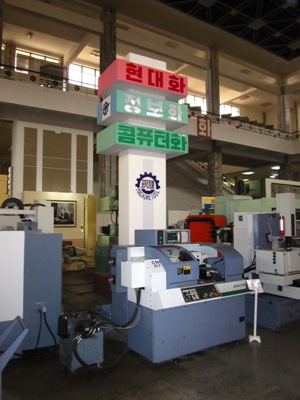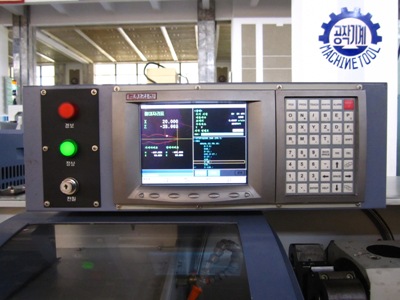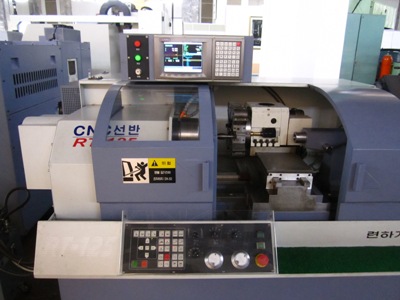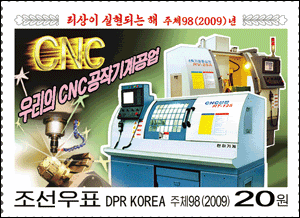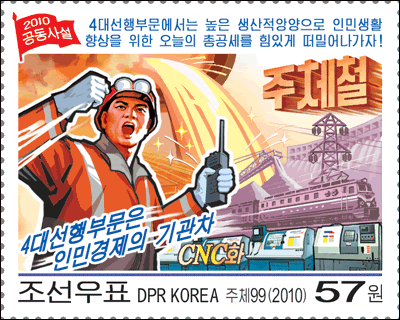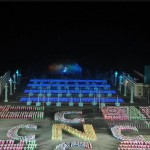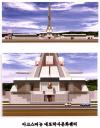UPDATE 2: More details are coming out about the US led initiative to track down DPRK-owned accounts in foreign banks.
According to the Choson Ilbo:
North Korean leader Kim Jong-il is believed to have a US$4 billion slush fund stashed away in secret accounts in Switzerland, Luxembourg and Liechtenstein.
According to sources, North Korean bank accounts in Russia are being tracked after the U.S. government obtained information that the Russian mafia is laundering money for the North. Kim Jong-il and other officials cannot engage in financial transactions using their real names, so they are believed to operate secret bank accounts or rely on the Russian mob.
Philip Goldberg, the former U.S. State Department envoy charged with enforcing UN sanctions, visited Russia in August last year and reportedly asked Deputy Foreign Minister Alexei Borodavkin to crack down on the mob for its involvement in laundering money for North Korea.
North Korean accounts held in African banks are being tracked, because the reclusive regime has been earning a substantial amount of money in the region by smuggling ivory and selling weapons. “Despite the UN sanctions, North Korea has opened up new markets in Africa and Latin America,” said one North Korean source.
The U.S. sanctions against North Korea are expected to differ from pressure applied to Macao-based Banco Delta Asia back in 2005. “Rather than freezing the operations of an entire financial institution like BDA by getting the U.S. Treasury Department to blacklist it on suspicion of money laundering, the measures this time will probably involve the tracking of individual North Korean accounts directly linked to illicit activities and freezing them,” a diplomatic source said.
Sanctioning entire banks could prompt North Korea to complain that its legal financial transactions are also being blocked and this could make the lives of ordinary North Koreans even more difficult. This is probably why U.S. Secretary of State Hillary Clinton said these measures “are not directed at the people of North Korea,” but at the “destabilizing, illicit and provocative policies pursued by that government.”
Others say the latest sanctions could be more comprehensive than previous ones by automatically limiting U.S. transactions with all banks found to deal in a certain amount of money with North Korea, rather than singling out particular banks. Under such pressure, banks could voluntarily sever relations with North Korean businesses or individuals to avoid being blacklisted.
The South Korean government has apparently notified the U.S. of between 10 to 20 North Korean bank accounts under suspicion of being involved in illicit deals. There are fears that massive Chinese aid to the North could render the U.S. sanctions useless, but judging from the vehement protests lodged by North Korea when its accounts at BDA were frozen, experts say financial sanctions are an effective means of pressure.
And according to a different Choson Ilbo story:
The U.S. will freeze North Korean leader Kim Jong-il’s overseas secret bank accounts based on a tip-off from a whistleblower at a state-run bank in Liechtenstein in 2006-2007.
The August issue of the Monthly Chosun said since the North’s attack on the South Korean Navy corvette Cheonan in March, speculation has been rife among North Korea experts in Washington that the Obama administration will freeze Kim Jong-il’s secret accounts in Liechtenstein and Switzerland.
The tip-off from Heinrich Kieber, a former employee of LGT Bank, which is owned by the Liechtenstein royal family, contributed decisively to the U.S. obtaining information about Kim’s secret accounts. According to the U.S. Senate, Kieber said the “head of department in a socialist government” wanted to deposit more than US$5 million “with no explanation in the files whatever in regard to the source of the vast amount.”
The U.S. recently signed a tax information exchange agreement with Liechtenstein which could allow it to freeze bank accounts suspected of belonging to Kim.
The US also plans to distribute a lack list of North Korean firms to distribute internationally. According to Asahi:
The United States plans to release a blacklist of North Korean companies and individuals believed to be involved in transactions of weapons of mass destruction and luxury items as part of new sanctions on Pyongyang in the wake of the sinking of the South Korean corvette Cheonan.
An official with the South Korean government divulged the plan on Friday. Seoul has been contacted by Washington about the blacklist.
The official said financial institutions would be under pressure to freeze or close accounts held by the companies and individuals on the blacklist.
The new measure is designed to avoid the problems that arose in September 2005 when the U.S. Treasury Department designated Banco Delta Asia of Macao as a financial institution suspected of laundering money for North Korea.
That designation caused a run on the bank and the Macao government was forced to place it under its control.
Under the new blacklist proposal, the United States hopes to provide financial institutions around the world with the names of individuals and companies with close ties to North Korea.
A South Korean government official said, “If a foreign government or financial institution does not cooperate with the new sanctions, there is the possibility that it could lose trust so the blacklist would apply silent pressure to conform.”
One problem is that many North Korean-related accounts are held in China and it remains unclear what, if any, cooperation will be obtained from Beijing and Chinese financial institutions.
One report from China does indicate that this strategy will make business with North Korea more difficult. According to the Korea Herald:
Chinese banks ― mostly bigger institutions with international operations ― will not be able to avoid the sanctions that the U.S. is pursuing against North Korea, an official here said Monday.
“The bigger banks cannot avoid the sanctions because all of its transactions go through the U.S.,” he said.
He stressed that even smaller institutions ― such as Banco Delta Asia in the past ― could come under scrutiny because all wiring services go through New York.
“This means that for everyone dealing with North Korea, it will become difficult for them to send and receive money from the North,” the official said on the condition of anonymity.
The U.S. has already called for a dozen banks around the world including those in China to freeze the North Korean assets in their accounts, according to diplomatic sources in Washington. The accounts are suspected of being used for illicit activities by the North, such as purchasing weapons, luxury goods and trading in counterfeit.
UPDATE 1: The US has already begun going after DPRK bank accounts. According to the Donga Ilbo:
The U.S. government will reportedly freeze some 100 illegal bank accounts allegedly linked to North Korea, a diplomatic source said Thursday.
Washington is known to have discovered about 200 bank accounts worldwide linked to Pyongyang in the process of mulling financial sanctions separate from those of the U.N. since the March 26 sinking of the South Korean naval vessel Cheonan.
“The U.S. is closely tracking 100 of the suspected accounts that are highly likely to be illegal,” the source said.
If Washington takes action against the accounts, including suspension of transactions, its sanctions are expected to be stronger than the September 2005 freeze of 25 million U.S. dollars in the North’s accounts at the Macau-based Banco Delta Asia.
“As U.N. Security Council resolutions 1718 and 1874 ban financial transactions that could be used for weapons of mass destruction or missile programs, bank accounts under borrowed names related to such transactions can be seen as illegal,” the source said.
“Investigations by the CIA and the Treasury Department will reveal how many of the 100 accounts are directly linked to illegal transactions.”
The source said the level of sanctions sought will likely be 100 times stronger than the measures taken against Banco Delta Asia.
Even if Washington imposes sanctions on illegal accounts, however, it will likely ask each bank to close them rather than disclosing them on its official gazette, the source said.
“Disclosing the names of the banks where the accounts were opened will likely cause a strong protest from the banks because of possible damage to the banks` reputations and transactions,” the source said. “The U.S. government has continued to consult the banks and will likely induce them to quietly close the accounts.”
A detailed outline of the U.S. financial sanctions is expected to be released by Robert J. Einhorn, new U.S. coordinator for sanctions on North Korea and Iran, when he visits Seoul early next month.
And according to the Joong Ang Daily:
The United States has already begun quietly freezing assets in North Korean accounts at about 10 banks around the world, diplomatic sources familiar with the situation told the JoongAng Ilbo yesterday.
On Tuesday in Seoul, U.S. Secretary of State Hillary Clinton said the U.S. would levy additional sanctions on North Korea for the March sinking of the Cheonan.
“The U.S. Treasury Department and intelligence authorities began looking into about 200 bank accounts that showed suspicious activities involving North Korea,” an informed diplomatic source said. “Bank accounts used to deposit money earned from the North’s exports of arms, in violation of UN Security Council resolutions 1718 and 1874, were studied, along with accounts used to purchase luxury goods believed to be supplied to the North’s leadership.”
Of the 200 suspicious accounts, U.S. authorities narrowed their attention to about 100 and began freezing their assets, the source said. The accounts belong to about 10 banks in Southeast Asia, southern Europe and the Middle East, the sources said. All the accounts were opened and operated under aliases, the source said.
Resolution 1718 was adopted on Oct. 14, 2006, after the North’s nuclear test that month. The main sanctions were an arms embargo, inspection of cargo going in and out of the North, an export ban on luxury goods to the North and the freezing of assets of individuals and entities designated by the UN sanctions committee. Resolution 1874 was adopted in June 2009 after the second nuclear test in May 2009, and it reinforced the existing sanctions.
While the U.S. was public about freezing North Korean accounts at the Macao-based Banco Delta Asia in 2005, the latest freezings were done quietly, the source said.
“When the U.S. authorities informed the banks that there were problems associated with certain accounts, the banks quietly froze the assets, making it hard for the media to detect,” the source said. “The assets in those accounts are likely to be money Kim Jong-il needs to operate his regime, so this will deal a serious blow to the North.”
“The U.S. began the freezings before June,” the source said. “The moves should be interpreted as a part of new sanctions on the North to hold it responsible for the sinking of the Cheonan.”
The assets in those accounts were presumably raised through illicit trade of arms, counterfeiting money, money laundering and drug trafficking, the source said. “In the past, the North deposited money in African bank accounts created under aliases and raised through trafficking in elephant ivory, selling of counterfeit Viagra and exporting arms in Africa,” the source said.
The source said the new financial sanctions will be different from what happened in the Banco Delta Asia crisis that stalled the six-party nuclear talks for years due to the North’s protest. Instead of naming and shaming a specific bank as a money laundering institution and pressuring it to freeze North Korean assets, “quiet” moves are now preferred to avoid blowback from Pyongyang, the source said.
Another source confirmed the additional financial sanctions, noting that, “If the charges are very clear, then the Banco Delta Asia method will be used, while the silent method will be used in more ambiguous cases.”
Meanwhile, a senior U.S. official said a package of sanctions aimed at stopping Pyongyang’s illegal activities will be announced in the next couple of weeks. In a press briefing in Washington on Wednesday, Assistant Secretary of State Philip J. Crowley elaborated on the fresh sanctions announced by Clinton in Seoul.
“Much of what we’ve done up to this point has centered on proliferation activities that stem from specific authorities,” Crowley said. “We’re moving into strengthening our national steps to attack the illicit activities that help to fund the weapons programs that are of specific concern to us – things like the importation of luxury goods into North Korea, concerns that we have long had about trafficking in conventional arms. So there are authorities that we will strengthen nationally, and we’ll have more to say about that in the next couple of weeks.”
North Korea’s counterfeiting of banknotes and cigarettes, diplomats’ smuggling of cigarettes, banking transactions that fund weapons programs and support the government and its policies were named as some of the illegal activities to be tackled under the sanctions.
Crowley also said Robert Einhorn, special adviser for nonproliferation arms control, will soon begin a trip to encourage countries that have been reluctant to implement earlier sanctions, noting that the North has found ways to sidestep the measures.
“They look to see if there are seams and gaps in the international effort,” Crowley said. “That’s what Bob Einhorn is going to be consulting with a range of countries where we think there needs to be more aggressive implementation of Security Council resolutions 1718 and 1874.”
Crowley, however, refused to say what Einhorn’s destinations are and if they include China.
“China obviously has a big role to play in this,” Crowley only said.
ORIGINAL POST: Sec. of State Hillary Clinton has announced the US will impose tighter financial sanctions on the DPRK. According to Al Jazeera:
The United States will impose new sanctions on North Korea in a bid to stem its nuclear weapons ambitions, Hillary Clinton, the US secretary of state, said.
Clinton said the measures were designed to stamp out illegal money-making ventures used to fund the nuclear programme.
“These measures are not directed at the people of North Korea, who have suffered too long due to the misguided priorities of their government,” Clinton said after talks with defence and military officials in South Korea on Wednesday.
“They are directed at the destabilising, illicit, and provocative policies pursued by that government,” she said.
She said the sanctions would be aimed at the sale or procurement of arms and related goods as well as the procurement of luxury items.
The US will freeze assets as well as prevent some businesses and individuals from travelling abroad, and collaborate with banks to stop illegal financial transactions, Clinton said.
Also the US Department of the Treasury (h/t Josh) has announced new procedures that apply to U.S. financial institutions maintaining correspondent accounts for “foreign banks operating under a banking license issued by” North Korea. According to FinCEN:
The Democratic People’s Republic of Korea (DPRK) has not committed to the AML/CFT international standards, nor has it responded to the FATF’s numerous requests for engagement on these issues. DPRK’s lack of a comprehensive AML/CFT regime poses a risk to the international financial system. DPRK should work with the FATF to develop a viable AML/CFT regime in line with international standards.
…
B. Jurisdictions in FATF Statement Section 2 have been identified by the FATF as having strategic AML/CFT deficiencies and not having committed to an action plan developed with the FATF to address key deficiencies. Based on the FATF’s adoption of the ICRG’s findings, a decision by the FATF in which the United States concurs, FinCEN is advising U.S. financial institutions of their increased obligations under Section 312 of the USA PATRIOT ACT, 31 USC § 5318(i). Accordingly, U.S. financial institutions should apply enhanced due diligence, as described under implementing regulations 31 CFR § 103.176(b) and (c) when maintaining correspondent accounts for foreign banks operating under a banking license issued by DPRK and São Tomé and Príncipe.
Also, the US Department of State has added the DPRK’s Korea Mining Development Trading Corporation (KOMID) to its list of sanctioned companies. According to the Chosn Ilbo:
The U.S. State Department on Tuesday put another North Korean company on a list of sanctions targets based on the Iran, North Korea, and Syria Nonproliferation Act.
The Korea Mining Development Trading Corporation was added to the list due to suspected dealings in weapons of mass destruction or ballistic missiles in violation of the Missile Technology Control Regime since 2006.
The company had already been designated by the U.S. Treasury Department as a target of financial sanctions. The blacklisting came as part of wider U.S. sanctions against the Stalinist country that largely cover well-trodden ground.
KOMID will not be permitted to conclude supply contracts with any U.S. government agencies or to take part in any U.S. government support programs. The newest round of sanctions will be effective for two years from the moment they take effect.



